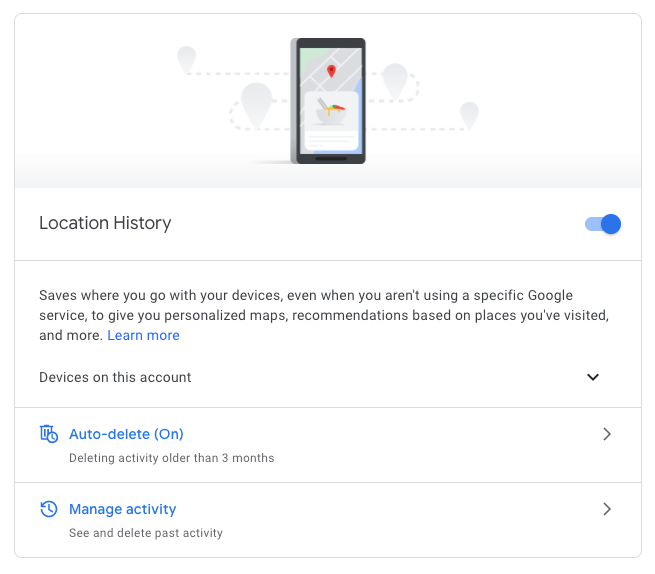Ahead of next week’s California Consumer Privacy Act (CCPA) enforcement deadline of July 1, Google announced a number of new privacy updates. The company doesn’t mention CCPA in its blog post, but the timing is probably not entirely coincidental.
Location History 18 month expiration. The primary announcement concerns Google Location History and a new 18 month, default auto-delete policy. Location history is opt-in (it wasn’t always). But if it’s turned on, user location data will now automatically be deleted after 18 months. Users can also delete their location data manually or set auto-delete to happen at three month intervals.
Today, auto-delete must be activated by the user. That will no longer be the case going forward. This is part of a broader set of moves by Google to give users more control over their (location) data over the past year or so after several location-data related scandals.
Auto-Delete Location History

Follows last year’s auto-delete options. Last May, Google introduced auto-delete options for search, voice, YouTube activity and Location History. It allowed users to manually delete or auto-delete their data after 3 months or 18 months, but the settings needed to be enabled by users.
Beyond Location History, Google says it’s going to bring auto-delete to most of its products for new accounts:
- Web & App activity auto-delete will also default to 18 months for new accounts.
- For new YouTube accounts auto-delete will be set to 36 months.
- Users of existing accounts will maintain their current settings and need to manually adjust them, but Google says it will prompt users to do so.
Google clarifies, however, that “default retention periods will not apply to other products like Gmail, Drive and Photos, which are designed to safely store your personal content.”
Privacy settings and Incognito mode. Google is also going to make privacy settings and controls more easily discoverable in search results. If users are signed in, “you’ll be able to search for things like ‘Google Privacy Checkup’ and ‘Is my Google Account secure?’ and a box only visible to you will show your privacy and security settings so you can easily review or adjust them.”
It’s also making it easier to use Search, Maps and YouTube in Incognito mode in mobile, by “long-pressing” your account profile image in the upper right. That will quickly turn on Incognito mode, which can then be turned off again equally easily.
Why we care. It’s very easy to be cynical about Google’s privacy changes, though in fairness to the company it has been improving things over time and making privacy easier to understand and more accessible. Google says that more than 200 million people annually use its Privacy Checkup tools, to which the company is adding “proactive recommendations” for users.
But there’s also clearly a way in which this is about PR and Google’s reputation. If users are confident that their data will automatically disappear they may be more inclined to opt-in to Location History. And anonymous searching may also prevent some defections to more privacy friendly search engines such as DuckDuckGo.
In making these changes, it’s unlikely that Google is sacrificing anything from a data or ad-targeting perspective — 18 months is a very long data retention period. In fact, just the opposite: if users feel more confident and engage with Location History, rather than shun it entirely, it will directly benefit Google and its advertisers.
http://feeds.searchengineland.com/~r/searchengineland/~3/Ia39i5oIkUQ/google-will-now-auto-delete-your-location-history-after-18-months-336620


